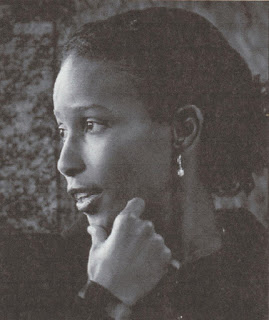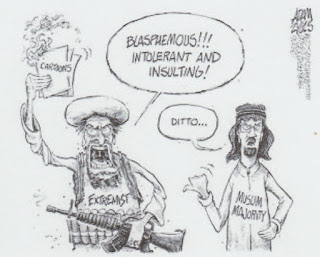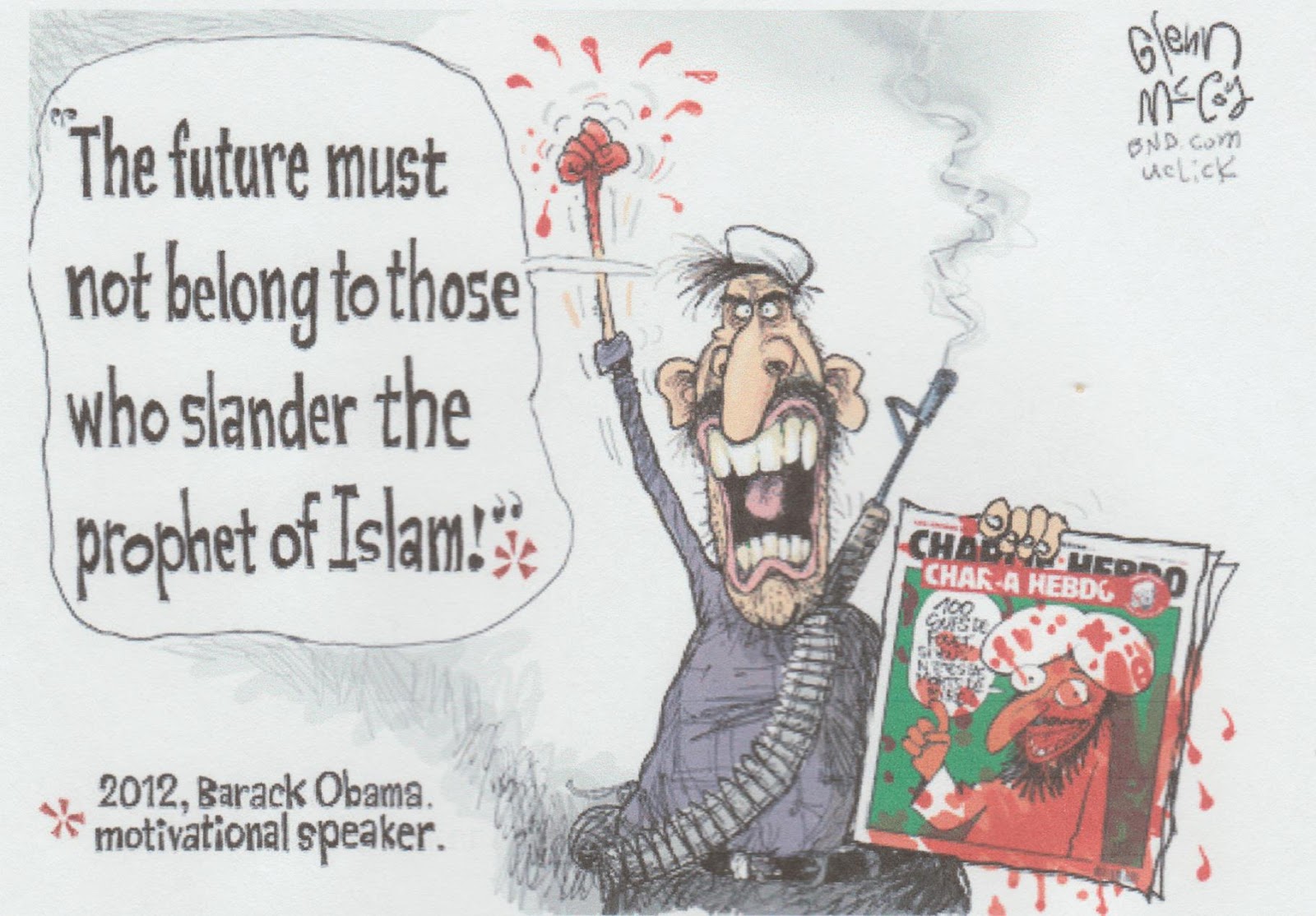AN UNNECESSARY DICHOTOMY
by Edward Cline
Even for someone who has experienced — nay, endured the rigors and brutality of Islamic "culture," such as Ayaan HIrsi Ali[1] — it may be difficult for that person to condemn the ideology-cum-religion of Islam and disown it as thoroughly and finally as one can Nazism or Communism, regardless of how Islam affected that person's life, publicly and personally. However, one can "disown" Islam yet some emotional connection to it may linger, like a virus that may lay dormant for decades and then begin to affect one's thinking and actions.

That state of lingering belief is utterly alien to me; I have been a committed, conscious atheist since my mid-teens. I dismiss all religious systems, dogmas, and tracts. Having been raised in the Catholic religion, I have never been tempted to find a replacement or substitute for it. Paraphrasing the American patriot Ethan Allen,[2] reason, then and now, has been to and for me the only "Oracle of Man," not Christ or Moses, and certainly not Mohammad. Allen's arguments against superstition are not mine; I rejected God and other ethereal deities, regardless of their names, for two reasons: their metaphysical impossibility, and for moral reasons of rejecting the power and influence of a "higher" authority over my existence and mind.
The lingering need of a person for a "higher" authority will cause him to sooner or later embark on a project of reclamation of, say, Islam, that will be at dramatic odds with a past record and stature as a critic of Islam, failing to realize that to criticize Islam is not enough. It must be repudiated wholesale; as in Nazism and Communism, there are no "redeeming" features in Islam.
I have said it many times before, in past columns over the years; Islam must be refuted and repudiated "root, branch, and twig."[3] There is no middle, reconciliatory ground to be advanced, argued, and promoted; the whole ideology must be tossed onto an intellectual bonfire with no regrets or personal recriminations or sense of loss. As an active "religion," it must be reduced to ashes.
It doesn't matter that, as an ideology, Islam is somewhat schizophrenic, exhibiting on one hand a "nice," laid-back, wouldn't-hurt-a-fly persona among the rank-and-file, non-jihadist Muslims, and on the other a mean, vile, vindictive, homicidal, and consistently destructive persona in actions dedicated to conquest and destruction for the sake of destruction among the "fundamentalists."
Granted, that religion, as a measure of moral guidance, has had a grip on man since the dawn of history, and even before when man first began carving or painting symbols and ideograms on stone tablets or on cave walls. Religion, as author/philosopher Ayn Rand has put it, is a primitive form of philosophy. She wrote that religion[4] demands:
"...blind belief, belief unsupported by, or contrary to, the facts of reality and the conclusions of reason. Faith, as such, is extremely detrimental to human life: it is the negation of reason. But you must remember that religion is an early form of philosophy, that the first attempts to explain the universe, to give a coherent frame of reference to man's life and a code of moral values, were made by religion, before men graduated or developed enough to have philosophy.
A clinging fealty to or respect for some religious belief, then, in spite of the outrages to which Ayaan Hirsi Ali was subjected by Islam in her life, including a perpetual death fatwa on her, drew her to attempt to salvage Islam in a Hoover Institution[5] paper published in March 2017, "The Challenge of Dawa: Political Islam Ideology and Movement and How to Counter."[6] It is in three versions: a printable, closely packed version;[7] a longer PDF[8] of it; and a shorter, excerpted version published on March 20th in the Wall Street Journal, "Why Islam Needs a Reformation."[9] A byline at the end of the Wall Street Journal article reads:
This essay is adapted from Ms. Hirsi Ali's new book, "Heretic: Why Islam Needs a Reformation Now,"[10] to be published Tuesday by HarperCollins....Her previous books include "Infidel"[11] and "Nomad: From Islam to America, A Personal Journey Through the Clash of Civilizations."[12]
The contents in the three versions differ negligibly. The paper is her solution to eventually ending the "civilizational" conflict between the West and Islam, so that Islam can truly be a "religion of peace,"[13] at least as the West understands[14] the term. The Muslim Brotherhood[15] would contest Hirsi Ali's contention that Islam can be a bona fide "religion of peace."
"The process of settlement is a 'Civilization-Jihadist Process' with all the word means. The Ikhwan must understand that their work in America is a kind of grand jihad in eliminating and destroying the Western civilization from within and 'sabotaging' its miserable house by their hands and the hands of the believers so that it is eliminated and God's religion is made victorious over all other religions."

That is, when it has attained "peace." Islamic fundamentalists wish to establish the same political power as the Church enjoyed for centuries in Europe, in the form of a caliphate.
Only twice in any version of her paper does Hirsi Ali mention the Brotherhood, and never once the 1991 Explanatory Memorandum[16] that details how Islam can conquer the U.S.
Hirsi Ali begins her Hoover paper with:
I argue that the American public urgently needs to be educated about both the ideology of political Islam and the organizational infrastructure called dawa that Islamists use to inspire, indoctrinate, recruit, finance, and mobilize those Muslims whom they win over to their cause.
There is no point in denying that this ideology has its foundation in Islamic doctrine. However, "Islam," "Islamism," and "Muslims" are distinct concepts. Not all Muslims are Islamists, let alone violent, though all Islamists—including those who use violence—are Muslims. I believe the religion of Islam itself is indeed capable of reformation, if only to distinguish it more clearly from the political ideology of Islamism. But that task of reform can only be carried out by Muslims. Happily, there is a growing number of reformist Muslims. Part of the Trump administration's strategy must be to support and empower them.
Not so happily, Trump has selected as his intelligence advisors some individuals, chiefly Sebastian Gorka,[17] Lt. General H.R. McMaster,[18] and retired General James Mattis[19] as Secretary of Defense, who shy away from saying that the U.S. is at war with Islam. Hirsi Ali continues:
In "How to Counter Political Islam,"[20] Hirsi Ali writes:The other part of the strategy requires confronting dawa, a term unfamiliar to Americans. Dawa as practiced by radical Islamists employs a wide range of mechanisms to advance their goal of imposing Islamic law (Sharia) on society. This includes proselytizing but extends beyond that. In Western countries, dawa aims both to convert non-Muslims to political Islam and to instill Islamist views in existing Muslims. The ultimate goal of dawa is to destroy the political institutions of a free society and replace them with the rule of Sharia law.
It cannot be said often enough[21] that the United States is not at war with Islam or with Muslims. It is, however, bound to resist the political aspirations of Medina Muslims where those pose a direct threat to our civil and political liberties. It is also bound to ensure that Mecca Muslims and reforming Muslims enjoy the same protections as members of other religious communities who accept the fundamental principles of a free society. That includes protection from the tactics of intimidation that are so central to the ideology and practice of political Islam.
What are Mecca Muslims and Medina Muslims? In the Wall Street Journal article, and in the other versions of her paper, she makes the differentiation:
In the early days of Islam,[22] when Muhammad was going from door to door in Mecca trying to persuade the polytheists to abandon their idols of worship, he was inviting them to accept that there was no god but Allah and that he was Allah's messenger.
After 10 years of trying this kind of persuasion, however, he and his small band of believers went to Medina, and from that moment, Muhammad's mission took on a political dimension. Unbelievers were still invited to submit to Allah, but after Medina, they were attacked if they refused. If defeated, they were given the option to convert or to die. (Jews and Christians could retain their faith if they submitted to paying a special tax.)
If they weren't first beheaded and slaughtered, and their wives and other female relatives taken into sexual slavery.
Her chief argument on how to defeat "political" Islam is to identify two different manifestations of Islam. Meccan Muslims can be characterized as peaceful Mormon or Jehovah's Witnesses doing door-to-door missionary work. Medina Muslims are the ones who break down the doors.
But Islam is nothing if not "political." It governs virtually every facet of an individual Muslim's life. Islam Today[23] emphasizes the "peaceful" character of Islam.
So we must ask our question again: What does Allah want from me as a Muslim in my dealings with others? To answer this question, we must return to the Qur'an and Sunnah. When we do, we find there can be no doubt that the texts point us to at least two types of concerns. First, it is obvious that we are supposed to propagate the faith and convey the message of Islam to others. There are many verses of the Qur'an and Prophetic hadith that call us to this duty. However, that is not all. There are also numerous texts that call upon us to serve humanity. How often are we told to respect, honor, and assist others? These texts help us to complete the picture of how we are expected to worship Allah in our daily lives.

The Mecca-Medina dichotomy concocted by AHA demonstrates how far "south" she has gone, making a completely artificial distinction between "moderate" Muslims and "radical" or "extremist" Muslims. The "peaceful" Islam is also altruistic, as altruistic as Christianity:
Prophet Muhammad (peace be upon him) said: "Whoever is engaged in fulfilling his brother's needs, then Allah will be fulfilling his needs." [Sahīh al-Bukhārī]
Likewise, he said: "Allah loves best the one who benefits people the most. The most beloved deed to Allah is to make a Muslim happy, remove his distress, pay off his debt, or placate his hunger. For me to go forth in fulfilling my brother's need is dearer to me than to observe a retreat in this mosque (in Madinah) for worship for a month... And whoever goes forth to fulfil his brother's need until it is taken care of, then Allah will make his feet tread steadily on that Day when feet will slip." [al-Silsilah al-Sahihah]
Prophet Muhammad (peace be upon him) is also reported to have said: "Whoever goes forth to fulfil his brother's need and makes headway in fulfilling that need, it is better than observing a retreat in the mosque for ten years." [al-Tabarānī, al-Bayhaqī and al-Hākim]
The Gatestone Institute,[24] on the other hand, in June 2013, reported an interesting observation by an Australian journalist:
Recently, Mark Durie's article highlights the efforts of the journalist Paul Sheehan, reflecting on the Woolwich beheading of Drummer Lee Rigby, and invited consideration of the view of Muslim violence in authoritative Islamic texts. In the Sydney Morning Herald of May 27, 2013, Sheehan observed that the Koran and the teachings of Muhammad seem to be a factor behind Muslim violence, and offered these critical observations:[25]
- Many violent attacks on civilians are done in the name of Islam.
- The existence of violent Islamic sectarian conflict and the repression of religious dissent in Muslim nations give the lie to the "absurd claim" that Islam is "the religion of peace."
- Many verses in the Koran call for violence against unbelievers, and these are invoked by Muslims who murder others: "So many Muslims have been encouraged to murder civilians by such exhortations that the rate of violent incidents perpetrated in the name of Islam is staggering, a toll that shows no sign of subsiding."
A rejoinder was published the next day by Associate Professor Mohamad Abdalla,[26] founding director of the Islamic Research Unit at Griffith University in Queensland, Australia. Abdalla rejected the proposition that Islam supports killing innocent people: "A contextual reading of the Koran or Hadith leads to one conclusion only: there is no justification for killing of innocent people..."
It all depends on "context," explains Abdalla. But the context is that of 1400 years ago.
It also needs to be understood that radical jihadis themselves use a contextual model to interpret the Koran: they do not simply rely on context-free interpretations or on proof-texts -- quotes taken out of context to support an argument. The Bin Ladins of the world -- and theologians such as Sayyid Qutb who paved the way for them -- have been more than familiar with interpretive tools such as the "context" of revelation, "abrogation," or the life of Muhammad. Such subjects are on the curriculum in the jihad factories.
What is disappointing about Abdalla's article is that the very texts he refers to only get worse when their context is taken into account. For example, he criticizes Sheehan for citing a passage from the second chapter of the Koran: "And slay them wherever ye find them ..." Abdalla writes:
Let us take a closer look at these six verses, with the help of a great Muslim scholar, Ibn Kathir,[27] whose commentary on the Koran has been translated into English, and is widely respected and read today by Muslims around the world. (The reader can examine the relevant part of the commentary here.[28])
First, here are the verses from the second chapter of the Koran:
190. And fight in the way of Allah those who fight you, but transgress not the limits. Truly, Allah likes not the transgressors.
191. And kill them wherever you find them, and turn them out from where they have turned you out. And Al-Fitnah is worse than killing. And fight not with them at Al-Masjid Al-Haram (the sanctuary at Makkah), unless they (first) fight you there. But if they attack you, then kill them. Such is the recompense of the disbelievers.
192. But if they cease, then Allah is Oft-Forgiving, Most Merciful.
193. And fight them until there is no more Fitnah (disbelief and worshipping of others along with Allah) and the religion (all and every kind of worship) is for Allah (Alone). But if they cease, let there be no transgression except against Az-Zalimin (the polytheists and wrongdoers).
194. The sacred month is for the sacred month, and for the prohibited things, there is the Law of equality (Qisas). Then whoever transgresses against you, you transgress likewise against him. And fear Allah, and know that Allah is with Al-Muttaqin.
195. And spend in the cause of Allah and do not throw yourselves into destruction, and do good. Truly, Allah loves Al-Muhsinin (those who do good).[Parentheses in the text.]
What is the context of this passage? It dates from the early Medinan period, when Allah had given permission to Muslims to fight against those who fought them: "fight in the way of Allah those who fight you, but transgress not the limits." (2:190) Abdalla is correct when he says that the phrase "slay them wherever you find them" (2:191) refers to fighting against those who fight Muslims: it is not a universal command to kill noncombatants or innocent people. Yet there is more to be said.
Ironically, verse 190 was one of the passages invoked by Michael Adebolajo, the killer of Drummer Lee Rigby, when he said:[29] "we are forced by the Quran ... through many, many ayah [verses] throughout the Koran that we must fight them as they fight us." [Emphasis added.]
So much would need to be gutted from a "reformed," rewritten Koran for a "reformed" Islam that, as a prescription for living the "good life," it would be reduced to the level of "Eat your vegetables" and "Wash behind your ears."
Observing in all three versions that the jihadists are seeking to impose the 7th Century vision of Islam on the world, in the Wall Street Journal[30] version of her paper, Hirsi Ali writes:
...The Mecca Muslims have a problem: Their religious beliefs exist in an uneasy tension with modernity—the complex of economic, cultural and political innovations that not only reshaped the Western world but also dramatically transformed the developing world as the West exported it. The rational, secular and individualistic values of modernity are fundamentally corrosive of traditional societies, especially hierarchies based on gender, age and inherited status.
Trapped between two worlds of belief and experience, these Muslims are engaged in a daily struggle to adhere to Islam in the context of a society that challenges their values and beliefs at every turn. Many are able to resolve this tension only by withdrawing into self-enclosed (and increasingly self-governing) enclaves. This is called cocooning, a practice whereby Muslim immigrants attempt to wall off outside influences, permitting only an Islamic education for their children and disengaging from the wider non-Muslim community.
It is my hope to engage this second group of Muslims—those closer to Mecca than to Medina—in a dialogue about the meaning and practice of their faith.....

Hirsi Ali lists the principal attributes of the Koran that must be amended or discarded if Islam is to be reformed:
I have identified five precepts central to Islam that have made it resistant to historical change and adaptation. Only when the harmfulness of these ideas are recognized and they are repudiated will a true Muslim Reformation have been achieved. Here are the five areas that require amendment:
1. Muhammad's semi-divine status, along with the literalist reading of the Quran.
Muhammad should not be seen as infallible, let alone as a source of divine writ. He should be seen as a historical figure who united the Arab tribes in a premodern context that cannot be replicated in the 21st century. And although Islam maintains that the Quran is the literal word of Allah, it is, in historical reality, a book that was shaped by human hands. Large parts of the Quran simply reflect the tribal values of the 7th-century Arabian context from which it emerged. The Quran's eternal spiritual values must be separated from the cultural accidents of the place and time of its birth.
2. The supremacy of life after death.
The appeal of martyrdom will fade only when Muslims assign a greater value to the rewards of this life than to those promised in the hereafter.
3. Shariah, the vast body of religious legislation.
Muslims should learn to put the dynamic, evolving laws made by human beings above those aspects of Shariah that are violent, intolerant or anachronistic.
4. The right of individual Muslims to enforce Islamic law.
There is no room in the modern world for religious police, vigilantes and politically empowered clerics..
5. The imperative to wage jihad, or holy war.
Islam must become a true religion of peace, which means rejecting the imposition of religion by the sword.
Hirsi Ali concludes:
I know that this argument will make many Muslims uncomfortable. Some are bound to be offended by my proposed amendments. Others will contend that I am not qualified to discuss these complex issues of theology and law. I am also afraid—genuinely afraid—that it will make a few Muslims even more eager to silence me.
In conclusion, I frankly do not care if Muslims can ever establish a "reformed" Islam — which I doubt they will -- no more than I care if a Christian ever experiences "rapture" or divination. Doubtless, Hirsi Ali will find some reform-minded Muslims who will work with her to try to strip Islam of its pernicious and aggressive political character. That would make Islam as anemic and impotent as Scientology.
What I do care about is whether or not our political leaders can grasp Islam by its fundamentals and understand that they must fight Islam — to defeat it. To burn it to ashes. Or at least is forced to retreat permanently into the dank, unhealthy hole from which it has emerged.
Before it triumphs by default and defeats the West.
Footnotes
[1] https://en.wikipedia.org/wiki/Ayaan_Hirsi_Ali
[2] http://libertyonline.hypermall.com/allen-reason.html
[3] https://edwardcline.blogspot.com/2016/05/a-complete-way-of-death.html
[4] http://aynrandlexicon.com/lexicon/religion.html
[5] http://www.hoover.org/fellows
[6] http://www.hoover.org/research/challenge-dawa-political-islam-ideology-and-movement-and-how-counter-it
[7] http://www.hoover.org/research/how-counter-political-islam
[8] http://www.hoover.org/sites/default/files/research/docs/ ali_challengeofdawa_final_web.pdf
[9] http://www.wsj.com/articles/a-reformation-for-islam-1426859626
[10] https://www.amazon.com/Heretic-Why-Islam-Needs-Reformation/dp/0062333941/ref=sr_1_1?s=books&ie=UTF8&qid=1491425665&sr=1-1&keywords=Heretic%3A+Why+Islam+Needs+a+Reformation+Now
[11] https://www.amazon.com/Infidel-Ayaan-Hirsi-Ali/dp/0743289692/ref=pd_sim_14_1?_encoding=UTF8&pd_rd_i=0743289692&pd_rd_r=G6EM4388XGB8HT7P9FAB&pd_rd_w=vUSvW&pd_rd_wg=rRzTc&psc=1&refRID=G 6EM4388XGB8HT7P9FAB;
[12] https://www.amazon.com/Nomad-America-Personal-Journey-Civilizations/dp/1439157324/ref=pd_bxgy_14_img_3?_encoding=UTF8&pd_rd_i=1439157324&pd_rd_r=G88VQCY5KRAQFN7P2JDS&pd_ rd_w=IJ5jd&pd_rd_wg=TcSOA&psc=1&refRID=G88VQCY5KRAQFN7P2JDS
[13] https://georgewbush-whitehouse.archives.gov/infocus/ramadan/islam.html
[14] https://www.usatoday.com/story/news/2017/01/31/bannon-odds-islam-china-decades-us-foreign-policy-doctrine/97292068/
[15] http://shariahthethreat.org/a-short-course-1-what-is-shariah/a-short-course-14-the-muslim-brotherhood%E2%80%99s-strategic-plan/
[16] http://www.centerforsecuritypolicy.org/2013/05/25/an-explanatory-memorandum-from-the-archives-of-the-muslim-brotherhood-in-america/
[17] http://www.breitbart.com/radio/2017/02/24/gorka-jasser-fighting-not-war-islam-but-war-inside-islam/
[18] http://www.foxnews.com/politics/2017/02/20/trump-selects-lt-gen-h-r-mcmaster-as-national-security-adviser.html
[19] http://thefederalist.com/2016/11/30/james-mattis-defense-secretary-bust-deathly-political-correctness-islam/
[20] http://www.hoover.org/research/how-counter-political-Islam
[21] http://www.hoover.org/research/how-counter-political-islam
[22] http://www.wsj.com/articles/a-reformation-for-islam-1426859626
[23] http://en.islamtoday.net/artshow-421-3838.htm
[24] https://www.gatestoneinstitute.org/3771/violence-islamic-texts
[25] http://www.smh.com.au/comment/twisting-islam-to-justify-cruelty-20130526-2n535.html
[26] http://www.smh.com.au/comment/critical-opinion-of-islam-ignores-the-fundamental-truths-20130527-2n7gg.html
[27] http://en.wikipedia.org/wiki/Ibn_Kathir
[28] http://www.qtafsir.com/index.php?option=com_content&task=view&id=236#1
[29] http://markdurie.blogspot.com.au/2013/05/the-woolwich-killing-we-must-fight-them.html
[30] http://www.wsj.com/articles/a-reformation-for-islam-1426859626
These comments were attached to the article.
Barbara Nelson "Trapped between two worlds of belief and experience, these Muslims are engaged in a daily struggle to adhere to Islam in the context of a society that challenges their values and beliefs at every turn." Well then, why don't they stay where their "values and beliefs" are not challenged daily or ever. |
|
Edward Cline They don't stay where they're not "challenged" because our government brings them in. It's the altruist thing to do, don't you know? |
Edward Cline A correspondent observed: I suspect AHA's recent history of arguing for the reformation of un-reformable Islam may have at least as much to do with her marriage to Niall Ferguson and positions at Harvard as it does with any nostalgia for her childhood religion. But that still doesn't explain why she would fall back on the false hope that a triumphant Islam would have any reason to want to modify itself once it had been made "victorious through terror" (and civilization jihad) to quote its figurehead. From Wikipedia's entry on Ferguson, below. I find his concern with Europe's abandonment of Christianity, well, concerning. I don't disagree with his evaluation of the Muslim invasion of Europe. But the problem is not chucking out the legend of Little Lord Jesus, just not replacing it with anything remotely rational. By the time Rome fell its tolerant paganism was being replaced by Christianity. So yes, the more consistent belief system -- 'fanaticism', as Ferguson correctly describes it -- insane though it may be, fills the vacuum. |
|
Edward Cline Nowhere in any of the three versions of her paper does she even mention the policy of abrogating the "peaceful" verses in the Koran in favor of the violent ones. It's as though she'd never heard of it. |
Edward Cline
is a novelist. best known for
The Sparrowhawk series of novels set in England and
Virginia in the pre-Revolutionary period.
He is a commentator and essayist, writing on religion and politics. He is dedicated to
Objectivism, Ayn Rand's philosophy of reason in all matters.
This article appeared April 6, 2017 and is archived at
https://edwardcline.blogspot.com/2017/04/an-unnecessary-dichotomy.html